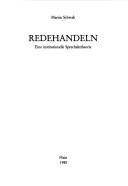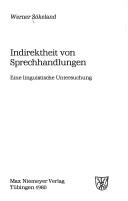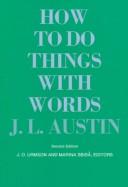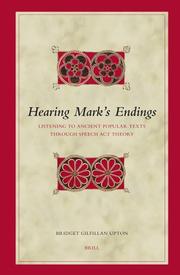| Listing 1 - 10 of 314 | << page >> |
Sort by
|

ISBN: 3445020728 Year: 1980 Publisher: Hain
Abstract | Keywords | Export | Availability | Bookmark
 Loading...
Loading...Choose an application
- Reference Manager
- EndNote
- RefWorks (Direct export to RefWorks)
Speech acts (Linguistics) --- Illocutionary acts (Linguistics) --- Speech act theory (Linguistics) --- Speech events (Linguistics) --- Language and languages --- Linguistics --- Speech --- Philosophy --- Pragmatics
Book
ISBN: 0585061475 9780585061474 1438408587 Year: 1984 Publisher: Albany State University of New York Press
Abstract | Keywords | Export | Availability | Bookmark
 Loading...
Loading...Choose an application
- Reference Manager
- EndNote
- RefWorks (Direct export to RefWorks)
Speech acts (Linguistics) --- Illocutionary acts (Linguistics) --- Speech act theory (Linguistics) --- Speech events (Linguistics) --- Language and languages --- Linguistics --- Speech --- Philosophy
Book
ISBN: 9783110231472 3110231476 Year: 2010 Volume: 27 Publisher: Berlin de Gruyter
Abstract | Keywords | Export | Availability | Bookmark
 Loading...
Loading...Choose an application
- Reference Manager
- EndNote
- RefWorks (Direct export to RefWorks)
German language --- Pragmatics --- Speech acts (Linguistics) --- Illocutionary acts (Linguistics) --- Speech act theory (Linguistics) --- Speech events (Linguistics) --- Language and languages --- Linguistics --- Semantics (Philosophy) --- Speech --- Philosophy

ISSN: 03446778 ISBN: 3484103825 3111381773 9783484103825 Year: 1980 Volume: 26 Publisher: Tübingen Niemeyer
Abstract | Keywords | Export | Availability | Bookmark
 Loading...
Loading...Choose an application
- Reference Manager
- EndNote
- RefWorks (Direct export to RefWorks)
Indirektheit von Sprechhandlungen. Eine linguistische Untersuchung
Speech acts (Linguistics) --- Illocutionary acts (Linguistics) --- Speech act theory (Linguistics) --- Speech events (Linguistics) --- Language and languages --- Linguistics --- Speech --- Philosophy --- German language --- Pragmatics --- Speech acts (Linguistics).
Book
ISBN: 3484301740 3111352617 Year: 1992 Publisher: Tübingen Niemeyer
Abstract | Keywords | Export | Availability | Bookmark
 Loading...
Loading...Choose an application
- Reference Manager
- EndNote
- RefWorks (Direct export to RefWorks)
Zur Klassifikation Von Sprechakten: Eine Grundlagentheoretische Fallstudie (Linguistische Arbeiten)
Pragmatics --- Speech acts (Linguistics). --- Speech acts (Linguistics) --- Illocutionary acts (Linguistics) --- Speech act theory (Linguistics) --- Speech events (Linguistics) --- Language and languages --- Linguistics --- Speech --- Philosophy

ISBN: 9780191680861 0191680869 019824553X Year: 1975 Publisher: Oxford Clarendon
Abstract | Keywords | Export | Availability | Bookmark
 Loading...
Loading...Choose an application
- Reference Manager
- EndNote
- RefWorks (Direct export to RefWorks)
This work sets out Austin's conclusions in the field to which he directed his main efforts for at least the last ten years of his life. Starting from an exhaustive examination of his already well-known distinction between performative utterances and statements, Austin here finally abandons that distinction, replacing it with a more general theory of 'illocutionary forces' of utterances which has important bearings on a wide variety of philosophical problems.
Language and languages --- Speech acts (Linguistics) --- Languages & Literatures --- Philology & Linguistics --- Philosophy --- #GROL:SEMI-130.2:8 --- Illocutionary acts (Linguistics) --- Speech act theory (Linguistics) --- Speech events (Linguistics) --- Linguistics --- Speech
Book
ISBN: 1283193078 1443831263 9786613193070 9781443828857 1443828858 9781443831260 9781283193078 6613193070 Year: 2011 Publisher: Newcastle Cambridge Scholars
Abstract | Keywords | Export | Availability | Bookmark
 Loading...
Loading...Choose an application
- Reference Manager
- EndNote
- RefWorks (Direct export to RefWorks)
Speech Act Theory: A Univen Study was undertaken to investigate the pragmatic value of utterances of selected students in university of Venda. Utterances of second -language users of a language reflect the wealth of their language experiences and hence ca
Speech acts (Linguistics) --- Communication. --- Communication, Primitive --- Mass communication --- Sociology --- Illocutionary acts (Linguistics) --- Speech act theory (Linguistics) --- Speech events (Linguistics) --- Language and languages --- Linguistics --- Speech --- Philosophy
Book
ISBN: 1282104950 9786612104954 9027290377 9789027290373 9789027234834 9027234833 Year: 2009 Publisher: Amsterdam Philadelphia John Benjamins Pub. Co.
Abstract | Keywords | Export | Availability | Bookmark
 Loading...
Loading...Choose an application
- Reference Manager
- EndNote
- RefWorks (Direct export to RefWorks)
Interrogative clauses in French show abundant variation, especially with regard to the position of the subject vis-à-vis the finite verb, the placement of the wh-word, and the use of question markers such as est-ce que and ti/tu. This book presents a comprehensive study of the evolution and use of French interrogative constructions across a time span of approximately five hundred years by drawing on written sources (15th to 17th century) and oral data (19th and 20th century). Special attention is paid to the regional variation between European French and Quebec French. A variationist analysis reveals the relevant sociolinguistic factors conditioning variant choice. On the basis of the results obtained, the syntax of the different variants is modeled within the framework of generative grammar. In particular, the progressive diachronic decline and restriction of subject-verb inversion is argued to mirror the loss of verb movement. This book is of interest to anyone concerned with syntactic variation and change.
French language --- Speech acts (Linguistics) --- Illocutionary acts (Linguistics) --- Speech act theory (Linguistics) --- Speech events (Linguistics) --- Language and languages --- Linguistics --- Speech --- Langue d'oïl --- Romance languages --- Interrogative. --- Philosophy
Book
ISBN: 9004217932 9789004217935 9789004204782 9004204784 Year: 2016 Publisher: Leiden Boston
Abstract | Keywords | Export | Availability | Bookmark
 Loading...
Loading...Choose an application
- Reference Manager
- EndNote
- RefWorks (Direct export to RefWorks)
In Potential Questions at the Semantics-Pragmatics Interface Edgar Onea proposes a novel component for question under discussion based discourse pragmatic theories thereby combining such theories with new ideas from inquisitive semantics. He shows how potential questions account for an entire range of grammatical phenomena. These phenomena include the semantics of indefinite determiners, the meaning contribution of nominal appositives, specificational constructions and non restrictive relative clauses. This book delivers a comprehensive and empirically rich investigation into the role of questions in natural language interpretation. Drawing on data from German, English, Hungarian and Russian, Edgar Onea's study significantly broadens our understanding of conventional sensitivity to questions through formally rigorous analyses of specificational particles, parentheticals and indefinites. The Potential Questions framework offers a new and exciting perspective on utterance meanings as not just addressing, but also raising questions, with important consequences for integrated analyses of discourse structure and discourse relations. This book is essential reading for anybody interested in the semantics-pragmatics interface. Judith Tonhauser, The Ohio State University
Speech acts (Linguistics) --- Language and languages --- Writing --- Chirography --- Handwriting --- Ciphers --- Penmanship --- Illocutionary acts (Linguistics) --- Speech act theory (Linguistics) --- Speech events (Linguistics) --- Linguistics --- Speech --- Philosophy. --- Philosophy

ISBN: 9789047417613 9789004147911 9004147918 Year: 2006 Publisher: Leiden; Boston : BRILL
Abstract | Keywords | Export | Availability | Bookmark
 Loading...
Loading...Choose an application
- Reference Manager
- EndNote
- RefWorks (Direct export to RefWorks)
Hearing Mark's Endings has two foci: it represents an attempt to show that ancient popular texts are written to be read aloud, and further, develops an aurally attuned hermeneutic to interpret them by. The contents of the book include rhetorical readings of the ancient popular texts, by Xenophon of Ephesus: An Ephesian Tale , and the ending of Mark's Gospel. These readings, which highlight the aural nature of the texts, are followed by a methodological justification for using Speech Act Theory as a hermeneutical tool, and further readings, of Xenophon's romance, and three endings of the Gospel of Mark. The book concludes that Speech Act Theory has, indeed, much to offer to the interpretation of these texts. The particular usefulness of this work lies in the contribution it makes to New Testament hermeneutics, in the testing of a particular, underused methodology to illuminate ancient popular literature. It will prove to be useful to all those interested in interdisciplinary methodological studies of biblical and other ancient popular literature.
Speech acts (Linguistics) --- Illocutionary acts (Linguistics) --- Speech act theory (Linguistics) --- Speech events (Linguistics) --- Language and languages --- Linguistics --- Speech --- Philosophy --- Xenophon. - Ephesiaca.
| Listing 1 - 10 of 314 | << page >> |
Sort by
|

 Search
Search Feedback
Feedback About UniCat
About UniCat  Help
Help News
News